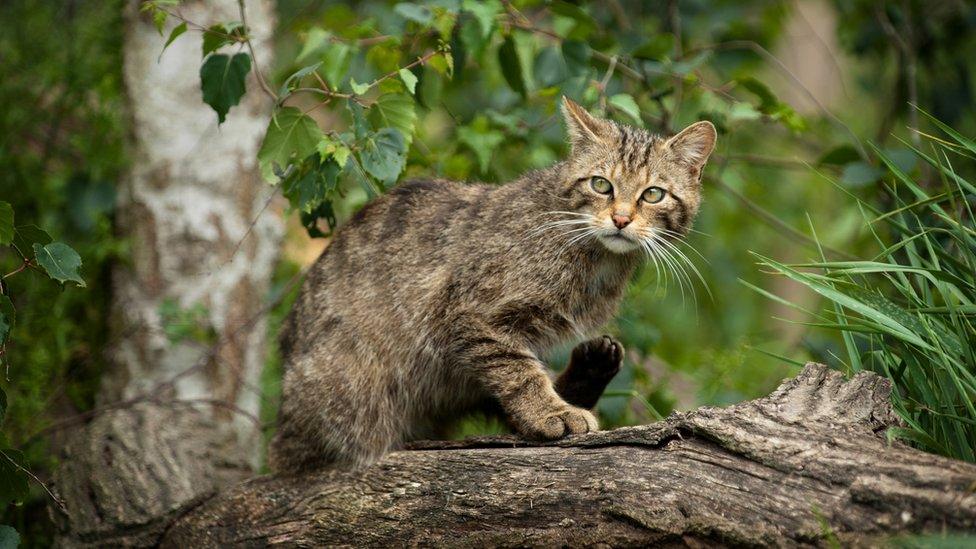Scottish wildcats are at risk of extinction, research finds
- Published
- comments

Scottish wildcats are under threat, but scientists have come up with a way to help them
Scottish wildcats are on the brink of extinction and a "nationwide effort" is needed in order to save them, according to new research.
Scientists at Scotland's nature agency NatureScot led a five-year project researching the highland felines, and found that there are almost no wildcats in the wild anymore.
One major risk factor they identified was hybridisation - this is when the wildcats have kittens with other feral or domestic cats, like the ones you may have as a pet.
Disease and loss of habitat were also said to be big risks to the Scottish wildcat population.
Wildcats once lived all across Britain, but they were hunted for many years, until by World War One they could only be found in Scotland
They like to live near woods and mountains
Their stripy coats have earned them the nickname 'highland tigers'
They're carnivores, meaning meat-eaters
They spend a lot of time sleeping and digesting their food during the day, and are most active around dawn and dusk
While they may look like a house cat, the genetic make-up of a wildcat is very different to that of a cat you may have as a pet
In their report though, the scientists did include a number of recommendations of how the animals can be saved.
They include breeding wildcats in captivity then releasing them back into the wild, and protecting and improving their natural habitats.
Scottish Biodiversity Minister Lorna Slater said: "The Scottish wildcat is an iconic and much loved native species, and yet its very existence is under threat."
How did the scientists conduct their research?
Funded by the National Lottery Heritage Fund, NatureScot led nine different surveys - collectively called Scottish Wildcat Action - between 2015 and 2020.
The surveys were done in areas where they believed conservation work could take place in the future.
Nature conservation means protecting our environment and the wildlife and plants that live in it for future generations
This includes everything from protecting species from extinction, maintaining and restoring habitats and preserving natural resources such as water, wood or fuel
Wildcats are carnivores, and mainly eat rabbits, voles and mice
They also ran genetic tests on 529 cat samples, but none of the results came back as being wildcats - they were all hybrid species.
Researchers were also trying to spot wildcats from cameras, and while 356 were spotted across six priority areas, none were found in the Highlands north of Lairg in Sutherland, and there was barely any evidence of them in Argyll and the Trossachs either.
Using GPS collars, 14 wildcat hybrids were also tracked to identify potential threats to wildcats and learn more about their behaviour and where they live.
What will happen now?
Dr Roo Campbell, NatureScot's Mammal Adviser and report author, said the project marks the start of lots of conservation work that can now take place, but that it can't be done alone.
"To succeed, wildcat conservation in Scotland next needs a nationwide effort with long-term commitments from all stakeholders over the coming decades," she said.
Breeding wildcats in captivity has been recommended as one way to save their species
She suggested that pet cats across Scotland will need to be microchipped and neutered (meaning they can't breed) in future, in order to protect the wildcat population.
Lorna Slater said the Scottish government would aim to to help the wildcat population: "Reversing the dramatic losses in nature that we have seen in recent times is one of the defining challenges that our country faces.
"The Scottish Government remains committed to this fight and is actively working towards protecting and restoring our natural environment."
- Published9 June 2022
- Published26 May 2022
- Published21 November 2019
